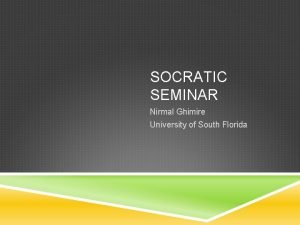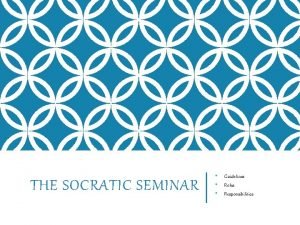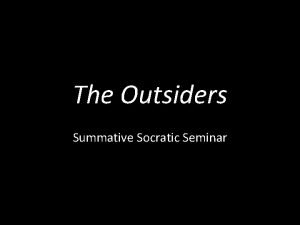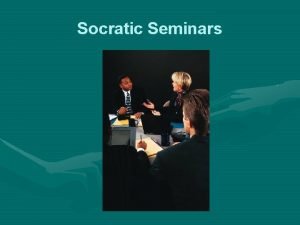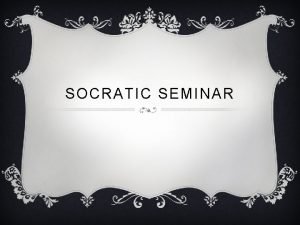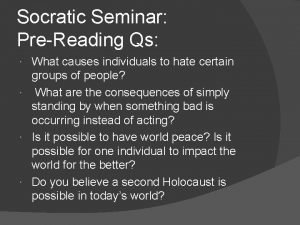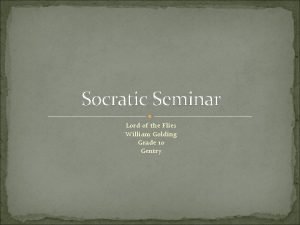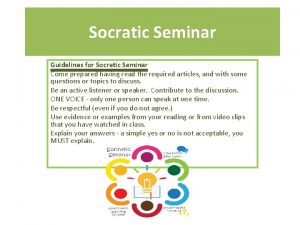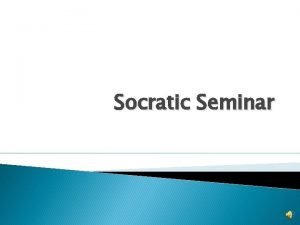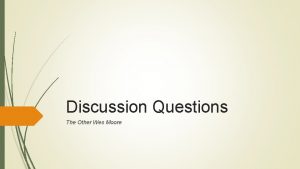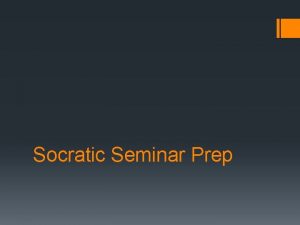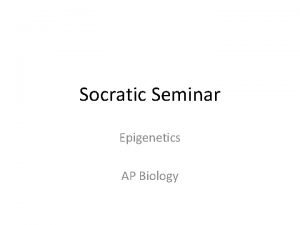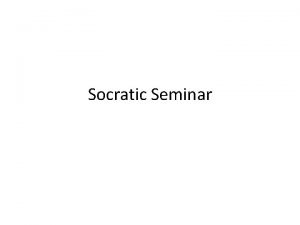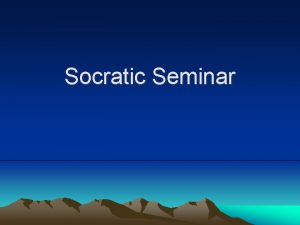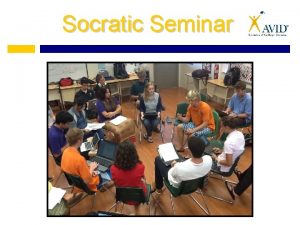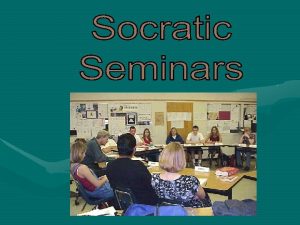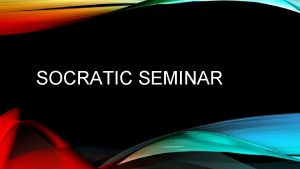SOCRATIC SEMINAR Nirmal Ghimire University of South Florida












- Slides: 12

SOCRATIC SEMINAR Nirmal Ghimire University of South Florida

CLASS OVERVIEW Introduction/ Seat Arrangement – 3 minutes Read an article about Socratic Seminar by Lynda Tredway- 5 minutes Discussion- 9 minutes Assessment- 2/3 minutes

WHAT IS SOCRATIC SEMINAR? A classroom discussion to enhance the depth knowledge about a given text through the practice of ‘DISCIPLINED CONVERSATION’ Named after a Greek Philosopher Socrates, who believed that the best way to ‘attain reliable knowledge is through ‘rigorously thoughtful dialogue’ (http: //pms. pasco. k 12. fl. us/wp-content/uploads/pms/2014/08/Socratic-Seminar. pdf)

WHY SOCRATIC SEMINAR? To get in-depth knowledge of the text To clarify one’s understanding about the text To enable students read critically To encourage student’s participation To create a community of inquiry To develop critical thinking, problem solving, speaking and listening skills

PROCEDURE Before the Seminar Introduce the seminar and its purpose to the students Have students read a text During the Seminar Forget that you are a teacher, don’t make any comments Ask open ended/challenging questions if needed After the Seminar Assessment Sharing for the class and assimilation

SMALL CLASS CIRCULAR ARRANGEMTNE

U-SHAPED ARRANGEMENT MEDIUM CLASS SIZE

BIG CLASS: FISH BOWL

APPLICABILITY/TEXT SELECTION Content Areas Texts 1. Language Arts Poems, essays, short stories, historical speeches, novels, plays, autobiography etc. 2. Social Science Historical Literature, law edicts, treaties, legal cases etc. 3. Physical Education/Health Codes of ethics, professional organization bulletins, medical practice guidelines, fitness guidelines, dietary recommendation etc 4. Mathematics Mathematical proofs, mathematical word problems, critical thinking puzzles, data information, theorem 5. Science Experimental design or protocol, chapters from the assigned curriculum (Source: www. santeefalcons. org/apps/downloads/Qc 101 URJBVZax. Np 3 v. VZnm 5 eacpjdh 6 c. Gkpxp 4 f 4 m. Pwi. Bux. Y. pdf)

ASK OPEN ENDED COMPELLING QUESTIONS Why questions? About the view point of perspectives (realist/optimist/pessimist) Examine the title/tone of the text/connect to the current issues/themes etc. Explore one’s own interpretation of the text About importance: “So what’s next…? ”, “What does it matter that…? ”, “What does it mean? ” (http: //www. montgomeryschoolsmd. org/uploaded. Files/schools/paintbranchhs/signature/Socraticseminarg uidelines 018. pdf)

GENERAL RULES FOR THE SOCRATIC SEMINAR Speak loudly and clearly Stay on topic Talk directly to your classmates not to the teacher Invite other people into the discussion Be respectful to other Listen carefully Avoid inappropriate language and hostile exchanges (https: //www. mwabr. org/sites/default/files/Soc. Sem. pdf)

ASSESSMENT Do you wish to use this strategy in your classroom? Why not? Mention three points.
 Nirmal ghimire
Nirmal ghimire Usf admission portal
Usf admission portal Socratic
Socratic Seminar sentence
Seminar sentence Socratic learning
Socratic learning Socratic seminar definition
Socratic seminar definition Socratic seminar questions for night
Socratic seminar questions for night Essential questions for lord of the flies
Essential questions for lord of the flies Socratic seminar images
Socratic seminar images Socratic seminar norms
Socratic seminar norms Socratic seminar def
Socratic seminar def The other wes moore questions
The other wes moore questions Questions about the glass castle
Questions about the glass castle
